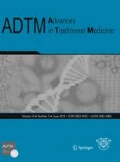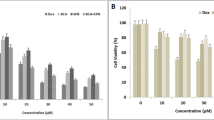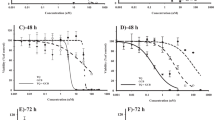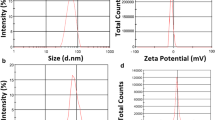Abstract
Tangeretin, shows cytotoxic effect on COLO 205 colon cancer cells. Combination of tangeretin with tamoxifen showed synergistic effect and increased the cancer cell sensitivity towards tamoxifen on T47D cells. However, the combination of tangeretin with chemotherapeutic agent doxorubicin on breast cancer cells have not been explored yet. Therefore, the aim of this research is to examine the improvement of cytotoxic effect of doxorubicin by tangeretin through cell death induction and cell cycle modulation on MCF-7 and T47D cells. The cytotoxic effect of tangeretin, doxorubicin, and their combination on tested cells were carried out by using MTT assay. Cell cycle distribution was determined by flowcytometer FACS-Calibur and the flowcytometry data was analyzed using ModFit LT 3.0 program. Cell death assay were done by double staining method using ethydium bromide-acridin orange. Single treatment of tangeretin 5–100 μM did not show cytotoxic effect on MCF-7 and T47D cells. The combination of tangeretin 50 and 100 μM with doxorubicin 200 nM (MCF-7) and 7.5 nM (T47D) increased the cytotoxic effect of doxorubicin on both breast cancer cell lines. This improvement of cytotoxic effect is due to cell death induction and cell cycle modulation. Furthermore, single treatment of tangeretin showed cell death only on T47D cell and caused G1-phase arrest on MCF-7 cell and G2/M-phase arrest on T47D cell. While doxorubicin induced cell accumulation at G2/M phase in both cancer cell lines. However, combination of tangeretin and doxorubicin increased cell death on both cancer cell lines, compared with doxorubicin by itself. The combination also showed G1-phase arrest on MCF-7 cell and increased cell accumulation at G2/M phase on T47D cell. Based on this result, tangeretin is potential to be developed as co-chemotherapeutic agent for breast cancer by inducing apoptosis and cell cycle arrest. However, the molecular mechanism need to be explored further.






Similar content being viewed by others
References
Akao Y, Itoh T, Ohguchi K, Iinuma M, Nozawa Y (2008) Interactive effects of polymethoxy flavones from citrus on cell growth inhibition in human neuroblastoma SH-SY5Y cells. Bioorg Med Chem 16:2803–2810
Bracke ME, Depypere HT, Boterberg T, Van Marck VL, Vennekens KM, Vanluchene E, Nuytinck M, Serreyn R, Mareel MM (1999) Influence of tangeretin on tamoxifen’s therapeutic benefit in mammary cancer. J Natl Cancer Inst 91(4):354–359
Davis JM, Navolanic PM, Weinstein-Oppenheimer CR, Steelman LS, Wei H, Konopleva M, Blagosklonny MV, McCubrey JA (2003) Raf-1 and Bcl-2 induce distinct and common pathways that contribute to breast cancer drug resistance. Clin Cancer Res 9:1161–1170
Di Leo A, Tanner M, Desmed C, Paesman M, Cardoso F, Durbecq V, Chan S, Parren T, Aapro M, Sotiriou C, Piccart MJ, Larsimont D, Isola J (2007) p-53 gene mutations as a predictive marker in a population of advanced breast cancer patients randomly treated with doxorubicin or docetaxel in the context of a phase III clinical trial. Ann Oncol 18:997–1003
Hermawan A, Meiyanto E, Susidarti A (2010) Hesperidin Meningkatkan Aktivitas Sitotoksik Doxorubicin pada Sel MCF-7. Majalah Farmasi Indonesia 21(1):8–17
Hirano T, Abe K, Gotoh M, Oka K (1995) Citrus flavone tangeretin inhibits leukaemic HL-60 cell growth partially through induction of apoptosis with less cytotoxicity on normal lymphocytes. Br J Cancer 72(6):1380–1388
Ishii K, Tanaka S, Kagami K, Henmi K, Toyoda H, Kaise T (2010) Effects of naturally occurring polymethyoxyflavonoids on cell growth, p-glycoprotein function, cell cycle, and apoptosis of daunorubicin-resistant T lymphoblastoid leukemia cells. Cancer Invest 28:220–229
Jemal A, Siegel R, Xu J, Ward E (2010) Cancer statistics, 2010. CA Cancer J Clin. doi:10.3322/caac.20073
Junedi S, Susidarti RA, Meiyanto E (2010) Naringenin Meningkatkan Efek Sitotoksik Doxorubicin Pada Sel Kanker Payudara T47D Melalui Induksi Apoptosis. Jurnal Ilmu Kefarmasian Indonesia 8(2):85–90
Kim H, Moon JY, Mosaddik A, Cho SK (2010) Induction of apoptosis in human cervical carcinoma HeLa cells by polymethoxylated flavone-rich Citrus grandis Osbeck (Dangyuja) leaf extract. Food Chem Toxicol 48:2435–2442
Kumar R, Vadlamudi RK, Adam L (2000) Apoptosis in mammary gland and cancer. Endocr Relat Cancer 7:257–269
Li X, Lu Y, Liang K, Liu B, Fan Z (2005) Differential responses to doxorubicin-induced phosphorylation and activation of akt in human breast cancer cells. Breast Cancer Res 7(5):R589–R597
Ling YH, el-Naggar AK, Priebe W, Perez-Soler R (1996) Cell cycle-dependent cytotoxicity, G2/M phase arrest, and Disruption of p34cdc2/Cyclin B1 activity induced by doxorubicin in synchronized P388 cells. Mol Pharmacol 49(5):832–841
Minotti G, Menna P, Salvatorelli E, Cairo G, Gianni L (2004) Anthracyclins: molecular advances and pharmacologic developments in antitumor activity and cardiotoxicity. Pharmacol Rev 56:185–228
Morley K, Ferguson P, Korotpatnick J (2007) Tangeretin and nobiletin induce G1 cell cycle arrest but not apoptosis in human breast and colon cancer cells. Cancer Lett 251(1):168–178
Pan MH, Chen WJ, Shiau SYL, Ho CT, Lin JK (2002) Tangeretin induces cell-cycle G1 arrest through inhibiting cyclin-dependent kinases 2 and 4 activities as well as elevating Cdk inhibitors p21 and p27 in human colorectal carcinoma cells. Carcinogenesis 23(10):1677–1684
Smith L, Watson MB, O’Kane SL, Drew MPJ, Lind MJ, Cawkwell L (2006) The analysis of doxorubicin resistance in human breast cancer cells using antibody microarrays. Mol Cancer Ther 5(8):2115–2120
Tanaka T, Makita H, Ohnishi M, Mori H, Satoh K, Hara A, Sumida T, Fukutani K, Tanaka T, Ogawa H (1997) Chemoprevention of 4-nitroquinoline 1-oxide-induced oral carcinogenesis in rats by flavonoids diosmin and hesperidin, each alone and in combination. Cancer Res 57:246–252
Valeria P, Barrera-Rodrigue R (2005) Changes in P-glycoprotein activity are mediated by the growth of a tumour cell line as multicellular spheroids. Cancer Cell Int 5(20), Summary
Van Slambrouck S, Parmar VS, Sharma SK, De Bondt B, Foré F, Coopman P, Vanhoecke BW, Boterberg T, Depypere HT, Leclercq G, Bracke ME (2005) Tangeretin inhibits extracellular-signal-regulated kinase (ERK) phosphorylation. FEBS Lett 579(7):1665–9
Vayssade M, Haddada H, Faridoni-Laurens L, Tourpin S, Valent A, Bénard J, Ahomadegbe J (2005) p73 functionally replaces p53 in adriamycin-treated, p53-deficient breast cancer cells. Int J Cancer 116(6):860–869
Yu B, Shen H, Gao F, Fan Y, Sun Z (2010) Expression of the apoptosis-related genes BCL-2 and BAD in human breast carcinoma and their associated relationship with chemosensitivity. J Exp Clin Cancer Res 29:107, pp 1–7
Acknowledgement
This work was supported by Program DIPA Universitas Gadjah Mada through Research Program Tim Hibah Pascasarjana Multitahun year 2009 and 2010.
Author information
Authors and Affiliations
Corresponding author
Rights and permissions
About this article
Cite this article
Meiyanto, E., Fitriasari, A., Hermawan, A. et al. The improvement of doxorubicin activity on breast cancer cell lines by tangeretin through cell cycle modulation. Orient Pharm Exp Med 11, 183–190 (2011). https://doi.org/10.1007/s13596-011-0016-4
Received:
Accepted:
Published:
Issue Date:
DOI: https://doi.org/10.1007/s13596-011-0016-4




